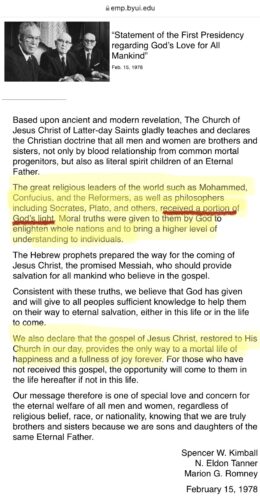Well — that was interesting. We took the Basic Doctrines Assessment and I have compiled the data. I sent a copy of the results to the YW President, YM President, SS President, and bishop for their reference.
You gotta know, the BDA is difficult. Really difficult. The font is difficult to read, especially when photocopied, and the *answers* are written to deceive. Many answers are “possible” but you have to choose the “best”. I’d call this a college-level test. None of my students got 100% on the first 21 questions (I threw out Section 1b for reasons described below), though I did have one that only missed one question.
The most valuable part of the BDA was the self-assessment at the end in Section Two. I feel confident that information can help us direct our lessons and activities to meet student needs. I am not so sure about the value of Section One. Here are the results of the test as I reported them to youth leaders by email, and I am also attaching the data as a spreadsheet for your information. If you use the BDA, visit this page, where I have posted my spreadsheet, which you can fill out to get a personalized assessment for your class as well.
Yesterday and today I gave the students in my Seminary class the Basic Doctrines Assessment. The test includes a self assessment that students can fill out to show how they are personally understanding and applying the gospel in their own lives. I’m attaching the results to this document.
Based on these results, the areas students report they need the most encouragement are (not in any special order)
- Establishing a habit of personal prayer
- Sharing the gospel with their friends
- Showing integrity when in bad situations or when with friends
- Keeping the Sabbath day holy/fasting
Doctrinal ideas that approximately 30% of youth have NOT internalized include:
- The covenants and ordinances of the temple are essential for eternal life.
- The Church of Jesus Christ of latter-day Saints is the only church that has authority from the Lord to perform the ordinance of baptism.
When I get the doctrinal questions entered I’ll pass along that data, too, in case it is helpful for SS/YM/W teachers to know how they might consider directing their Come Follow Me lessons to meet student needs.
And the Self-Assessment:
Attached are the results of the doctrinal questions. There’s a couple of things you need to know when assessing the data.
First, not all students completed all 21 questions. Some actually skipped around, answering questions at random. Others were not present when I administered the first part of the test.
Second, this is a HARD test. The questions are not terribly difficult, but the answers are intended to confuse. Very few adults could take the test and score perfectly. I took a similar version of the test and did not score 100%, though I was able to get 100% on this version. Seriously — it’s hard.
Third, so few students even made it to question 21 due to the difficulty of the material that the the results of Section 1b will not be accurate and will only reflect the answers of either students who just guessed or those who really, really know their stuff, dramatically skewing the results. I have not bothered to try to compile that information because the data is suspect.
I am not sure how much weight to place on the results of this particular test for a number of reasons, including that difficulty simply reading the test (terribly font, awkward wording) is going to affect results as well.
At any rate, questions where 70% of students responded incorrectly or “don’t know” are reported below, ranked by the FEWEST number of correct responses:
- Patriarchal blessings, partaking of the sacrament, and blessing children are not ordinances performed for the dead because they are __________.
- Which scripture describes the beginning of a dispensation?
- Why are the blessings of the temple essential for eternal life? Because the temple is the only place __________.
- John’s friends believe in the Bible but have different opinions about the nature of God. Which event would be the best one John could share to help them understand our beliefs about God?
- What is the correct definition of immortality?
- To be reconciled to God means __________. && The results of the __________ made it possible for us to be tested by the difficulties of life and the temptations of the adversary.
- Why do we close all prayers in the name of Jesus Christ? && What statement from The Proclamation on the Family corresponds with the teachings in this verse? “And ye will not suffer your children that they go hungry, or naked; neither will ye suffer that they transgress the laws of God, and fight and quarrel one with another, and serve the devil, who is the master of sin” (Mosiah 4:14).
These results are consistent with the earlier test, showing that students in my Seminary class lack a clear understanding of the necessity of temple ordinances, and they do not have a clear understanding [of] or commitment to personal prayer.
They are also lacking an understanding of gospel jargon terms, like immortality, dispensation, eternal life, and reconciliation.
One interesting finding is that only roughly half of students knew that they could tell the story of the First Vision to show LDS beliefs about God. This might help us recognize a key reason that students aren’t comfortable sharing the gospel with their friends : they simply don’t understand how or which gospel stories/doctrines can be used in non-threatening, informal gospel discussion. I’m feeling some role play coming on.
Hopefully this is of some value in helping us know where we youth leaders can place emphasis in our lessons, talks, etc.,
-j



